Our Family Birthing Centre (FBC) provides quality, family-centred care in a safe and welcoming environment. When you access this page, you will discover the sections below dedicated to specific topics:
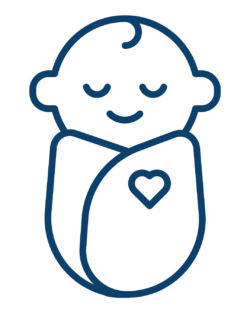
Follow-up appointments |

Our Family Birthing Centre (FBC) provides quality, family-centred care in a safe and welcoming environment. When you access this page, you will discover the sections below dedicated to specific topics:

Follow-up appointments |
The HGH Family Birthing Centre (FBC) team is pleased to be able to share this significant event with you and your family. Thanks to our best practices and state-of-the-art technology, we welcome over 450 families and their newborns every year.
During your pregnancy, your family doctor will refer you for follow-up appointments and hospital delivery. Our team of professionals provides safe, quality, family-centred care. They follow guidelines and standards of practice through the original SG.solutions program, MoreOB, the Society of Obstetricians and Gynaecologists of Canada and the Champlain Maternal Newborn Regional Program.
We encourage you to participate in your healthcare and all health-related decisions actively.
Here’s one of our rooms to give you a glimpse of our facilities:
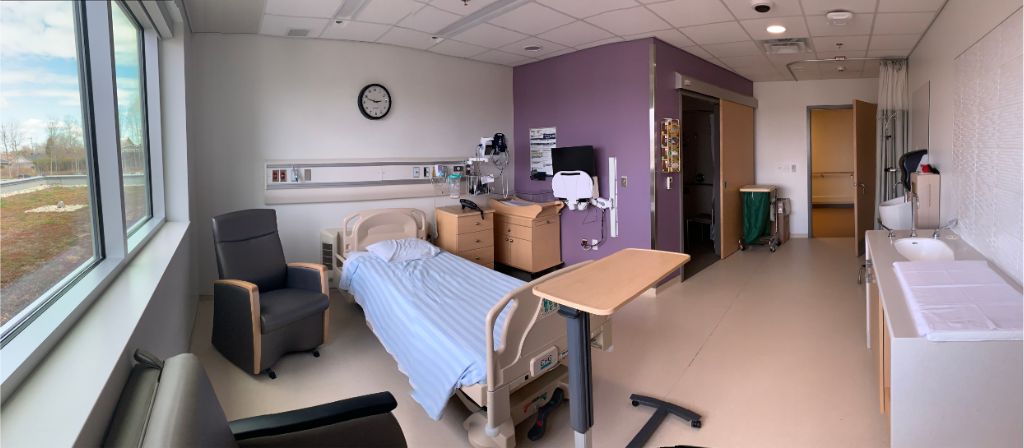
Family physicians who deliver babies |
||
| Dr. Pascale Hunter Poelman | Dr. Laura Brown | Dr. Mélissa Brunet |
| Dr. Émilie Langlois | Dr. Jeff P. Graham | |
Obstetrician | Gynecologists |
||
| Dr. Stephanie Ahken | Dr. Milena Garofalo | Dr. Mathieu Legault |
| Dr. Stéphanie Paquette | ||
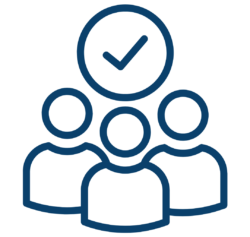
*A quiet period is in effect from 9:00 p.m. to 6:00 a.m.
Your hospital stay usually lasts from twenty-four (24) to forty-eight (48) hours for a vaginal birth and from forty-eight (48) to seventy-two (72) hours for a cesarean section. The duration may vary according to the state of health of the patient and baby.
When the most responsible physician (MRP) authorises your discharge from the hospital, we ask you to complete your discharge arrangements and vacate your room within one hour. Preparing your newborn’s car seat and planning your ride home is essential.
At HGH, you’re free to choose. You can enjoy various meals, drinks and snacks from our kitchen or bring your own for your stay. Please note that each room is equipped with a mini refrigerator where you can store your food.
For accompanying persons, the cafeteria serves meals that can be purchased Monday to Friday from 7:00 a.m. to 4:00 p.m. and from 5:00 p.m. to 7:00 p.m., and on Saturday and Sunday from 7:00 a.m. to 2:00 p.m.
If your doctor is attached to HGH, we can offer you some services. However, our hospital does not yet cover the delivery of twins, triplets, or other multiples. We encourage you to talk to your doctor as soon as possible to take the necessary steps for your delivery.
Canadians without a health cardAny Canadian who needs health care must have a health card issued by their province or territory to gain access to the universal health care system. If you do not have a health card, it is possible to pay the full amount of expenses incurred during visits, including examinations, consultations, procedures, products, services, etc. You can also obtain a card issued by your province or territory before you give birth. To do so, please consult the Government of Canada’s Health Cards section. We recommend that you complete and return your form quickly, as it can take up to three months before you benefit from public health insurance. If these options are not for you, you can always contact a private insurer, as they may be able to cover some of the costs involved. |
Non-residents of CanadaAnyone who does not have a health insurance card issued by a Canadian province or territory must pay the full amount of expenses incurred by the mother and newborn during their visits, including examinations, consultations, procedures, products, services, etc. If this applies to you, please get in touch with the clerk at (613) 632-1111 extension 52003 for more information. Do not forget to mention if a private insurance plan covers you. For all cost information, our clerk can refer you to the finance department. Here is a relevant resource from Best Start by Health Nexus: Giving Birth in a New Land (PDF). |
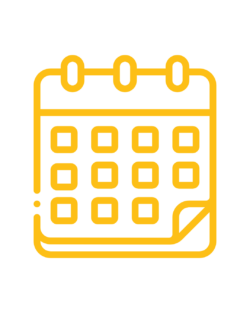 eeks with your obstetrician.
eeks with your obstetrician.You need to know several essential things before arriving at the hospital for your delivery. Consult the sections below to learn more about various topics and to be well prepared.
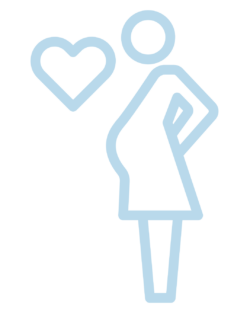
Congratulations, you just found out that you’re pregnant! To have a healthy pregnancy, being well informed and making the best choices for you and your baby is essential.
Here are two guides to help you during your pregnancy and after the birth of your baby.
Tobacco use and exposure to second-hand smoke raise several risks during pregnancy for both you and your baby. Get help to quit smoking. Ask our FBC team to have a consult with our HGH Quit Smoking Program. You can also consult:
Prenatal classes are valuable opportunities to learn what to expect during pregnancy.
Ontario residents: To register for prenatal classes offered by the Eastern Ontario Health Unit (EOHU), visit the Prenatal Classes | EOHU | Public Health. If you prefer a complete virtual program, they also offer Une Nouvelle Vie, where you can learn at your own pace and schedule.
Quebec residents:
Here’s who you should contact, depending on which stage you’re currently at.
Less than 20 weeks of pregnancy |
More than 20 weeks of pregnancy |
| Contact your physician or go to the Emergency Department.
*During pregnancy appointments, your physician will discuss the importance of fetal movement counting. |
We encourage you to contact your physician if you have any concerns.
If it’s impossible, call our Family Birthing Centre. The healthcare professionals will assess you on the phone and schedule an appointment in person if needed. |
| Obstetrics clinic: (613) 632-1111, extension 52003
If necessary, you can contact a nurse at (613) 632-1111, extension 52001. |
|
Before birth, you must have chosen a physician to care for the newborn (family physician or paediatrician). We recommend that you make an appointment within forty-eight (48) hours of your discharge from the hospital.
Here are resources to help you find a physician or a nurse practitioner:
Here’s a list of what you need for your hospital stay. Please be aware that the HGH is a fragrance-free environment, so we ask you not to bring any scented products.
** Please DO NOT bring jewelry, large amounts of cash, or valuables. The HGH is not responsible for loss or theft. **
For the newborn
A properly used car seat can save your baby’s life and is essential to leave our hospital. Read the manufacturer’s instructions before your baby is born and follow all age, height, and weight specifications.
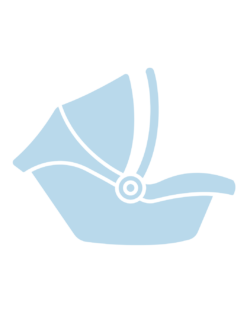
Proceed to the Family Birthing Centre when you arrive at HGH to give birth. The team will assess and assign you a room if you meet all the criteria.
For more information on the start of labour to the first few days, consult the Delivery resource from Tiny Tot to Toddler (PDF).
Vaginal Birth |
Cesarean Section |
| This method involves giving birth to a child through the vaginal canal. This method is often preferred to cesarean section, as it offers faster recovery and fewer risks. During a vaginal birth, the mother goes through the various phases of labour, such as contractions and pushing. | A cesarean section (C-section) is a surgical procedure during which a physician makes an incision through seven layers to remove the baby and placenta. This procedure can be planned or performed on an emergency basis. |
| Learn more about comfort measures and pain management: Best Start by Health Nexus | Comfort Measures | Learn more about C-sections:
|
For more information on what is available and what can be done during your labour and delivery at HGH, ask your obstetrical providers or call us at the Family Birthing Center: 613-632-1111, extension 52003
After birth, many resources and programs can help you adjust to this new reality, both during your hospital stay and after returning home.
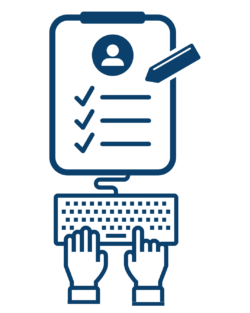 Two (2) electronic documents must be completed for Ontario residents to register their newborn with the Office of the Registrar General—the first by our team of professionals and the second by the parents.
Two (2) electronic documents must be completed for Ontario residents to register their newborn with the Office of the Registrar General—the first by our team of professionals and the second by the parents.
Ensure you can access a personal computer or a printer to save your receipt in a safe space. If you have any questions, please call
or fax (416) 325-3408.
Here are some Service Ontario offices where computers are available, and you can get help registering your newborn’s birth.
| Hawkesbury
179 Main Street East, Suite C, Monday to Friday from 8:30 a.m. to 5:00 p.m. |
Rockland
928 Laporte Street, Unit 140 Monday, Tuesday, Wednesday and Friday from 9:00 a.m. to 5:00 p.m., Thursday from 9:00 a.m. to 6:00 p.m. and Sunday from 9:00 a.m. to 1:00 p.m. |
| Alexandria
101 Main Street North Monday to Friday from 9:30 a.m. to 5:00 p.m. |
Cornwall
720 14th Street West, Unit 2 Monday to Friday from 8:30 a.m. to 5:00 p.m. |
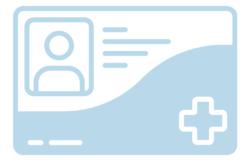
Retraite QuébecAs a person who lives in Quebec, you can also receive financial assistance from Retraite Québec. Financial aid is intended for families with dependent children under 18. If your child was born outside Quebec, you must apply for financial assistance, either online at Retraite Quebec—Family Allowance (gouv.qc.ca) or by phone at 1 (800) 667-9625 and let them know that your baby was born in Ontario. Therefore, you must complete and order the birth registration when you return home. |

Breast milk is all your baby needs for the first six months. We know that some parents choose to give commercial formula from the start for many reasons (resources for commercial formulas feeding are available below.) At HGH, it is your personal decision, and no judgement will be passed upon your choice. If you wish to breastfeed, here are a few things we suggest you do as soon as your baby is born:
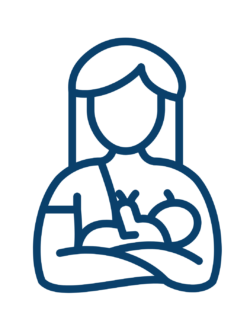
Here are some relevant resources to help you learn more about breastfeeding:
| Province specifics resources |
|
| Ontario residents | Quebec residents |
|
|
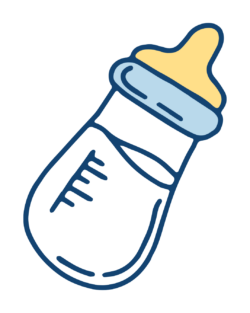
Some families consider using infant formula, either exclusively or as a complement. This decision may be made for medical or personal reasons. Either way, our nurses can teach you how to prepare, feed and transport infant formula. For more information on commercial formulas, visit the following Best Start resources by Health Nexus:
Feeling unsure and wanting all the information? You can also read Feeding Your Child (PDF) from Tiny Tot to Toddler. They’re explaining everything from breastfeeding, bottle feeding, water and solids.
As new parents, you must create a safe sleeping environment for your baby by following the Canadian guidelines for cribs and bassinets. We also recommend that you share a smoke-free room with your newborn baby for the first six months. The safest way to think about creating a baby’s sleeping space is to consider the ABCs—putting your baby Alone, on its back, in an approved Crib or Cradle. Resources for safe sleep:
|
|
Jaundice is common and is a normal part of your baby’s adjustment to life after birth. Your baby will be screened within 24 to 72 hours
after birth with a heel prick blood test or an external reading from the skin using a bilimeter.
If you think your newborn baby is developing jaundice, please consult the PCMCH pamphlet and consult your doctor if you have any concerns. If you are unable to reach your health care provider, take your baby to the hospital.
YouTube series on newborn care produced by Ottawa Public Health:
Parents know that their baby cries sometimes. A baby’s inconsolable cries can be very worrying and frustrating for sleep-deprived parents. To help you better understand and cope with your baby’s crying, here’s an educational sheet (PDF) written by CHEO professionals. (in French only)
Circumcision is not offered at the Hawkesbury General Hospital. To obtain these services, here are the closest clinics you can contact:
Please note that costs associated with this procedure are not covered by OHIP.
Our community partners, the Eastern Ontario Health Unit or the CLSC, offer programs designed to help families make healthy choices. The Health Unit offers the program Healthy Babies, Healthy Children . CLSC follow up with phone calls and visits within a few days after giving birth.
These partners will provide you with a variety of programmes specially designed to help families grow up healthy.
You will need to make an appointment with your family doctor for post-partum follow-up one (1) to two (2) weeks after your delivery (depending on your delivery physician’s instructions).
If you have any questions and/or concerns within two (2) weeks of the birth of your baby, please do not hesitate to contact us at (613) 632-1111 ext. 52001 or visit your nearest hospital.
HGH — Main Campus (Block D2)
1111 Ghislain Street, Hawkesbury, ON K6A 3G5
613-632-1111, extension 52003
The Hawkesbury and District General Hospital (HGH) provides more than 40 specialized medical clinics for residents of Prescott-Russell and surrounding region. For a list of clinics, departments and services, visit Refer a patient.